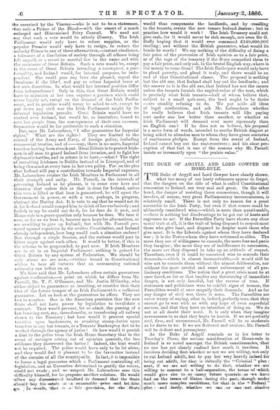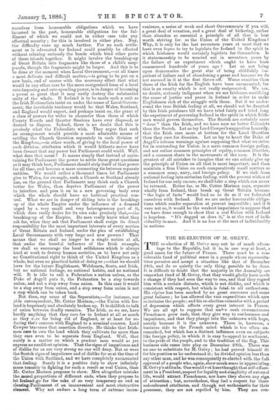THE DUKE OF ARGYLL AND LORD COWPER ON HOME,RULE.
rr HE Duke of Argyll and Lord Cowper have clearly shown,
what too many of our hasty reformers appear to forget, that the dangers on the side of what is called Constitutional concession to Ireland, are very real and great. On the other hand, the danger of resisting those concessions, though it will involve, of course, very great Parliamentary inconveniences, is relatively small. There is not only no -reason tor a great surrender to the Irish Party, but even if that course could be ultimately considered wise,—which is:more than questionable, —there is nothing but disadvantage to be got out of -haste and eagerness to act. If the Parnellite Party have shown any clear moral trait at all, it is the trait of being disposed to respect most those who give least, and disposed to despise -most-these who give most. It is the Liberals against -whom they have declared war ; it is the Tories-whom they have-welcomed-as allies. The more they see.of 'willingness to concede, the morefear and panic they imagine ; the-more they see of indifference to concession, the more are they disposed to take up an attitude of respect. Therefore, even if it could be conceived wise to concede-their demands,—which is almost inconceivable,—it would still be wise not to concede them without the utmost deliberation, nor without the most careful and exact enforcement of all pre- liminary conditions. The notion that a great crisis must -be at once faced, so far as that implies any threatening of immediate
danger, is not only fanciful, but the reverse of true. If statesmen and politicians were to exhibit signs of tremor, the Parnellites would at once magnify their demands. And as for any danger of civil war, there is none. The Parnellites are never weary of saying, what is, indeed, perfectly true, that they cannot go to war with us with any hope of even superficial success, and that they have no intention of doing so. We do not at all doubt their word. It is only when they imagine nervousness in us that they begin to hector. If we are perfectly cool, firm, and unconcerned, Mr. Parnell will be as 'moderate as he dares to be. If we are fluttered and anxious, Mr. Parnell will be defiant and peremptory.
As the Duke of Argyll reminds us in his letter to Tuesday's Times, the serious consideration of Home-rule in Ireland is so novel amongst the British constituencies, .that no one has /et clearly realised how much it involves. It involves deciding firstwhether or not we are willing, not-only to-cut Ireland adrift, but to pay her very heavily indeed for being cut adrift, for -that is ,virtually the "Colonial" plan ; next, if we are not • willing to do that, whether we -are willing to _consent to .a half-separation, the terms of 'which would give rise to as -.many future quarrels as "we have ,.had -an the terms :of Thelon during the tpast,,tliorigh under :ranch more :complex conditions, :for-that-is he • " Federal" ,and Liasbly, nakether :we -can aor -man .not _absolve ourselves from honourable obligations which we have incurred in the past, honourable obligations for the ful- filment of which we could not in either case take any effectual security ; for this is involved in either plan. Nay, the difficulty runs up much further. For no such settle- ment as is advocated for Ireland could possibly be effected without relaxing seriously the bonds which bind other parts of these islands together. It might involve the breaking-up of Great Britain into fragments like those of a child's map- puzzle, though the fragments might be larger. And this is to be -done at the moment when Local Government,—at all times a most delicate and difficult matter,—is going to be put on a new basis, and of course with the necessary effect that what would in any other case be the mere reorganised form of a local rate-imposing and rate-spending power, is in danger of becoming a power so great that it may easily destroy the substantial unity of the whole. If Ireland is to be made such a unit as the Irish Nationalists insist on under the name of Local Govern- ment, the inevitable tendency would be that Wales, Scotland, and, England would expect, and perhaps insist on, the grant of a class of powers far wider in character than those of which County Boards and Quarter Sessions have ever disposed, or desired to dispose. Indeed, there is no doubt that this is precisely what the Federalists wish. They argue that such an arrangement would provide a most admirable means of settling the Church Question separately in each division of the Kingdom,—in other words, of giving to the local power of each division, attributes which it would hitherto never have been dreamt that any power but Parliament could wield. Well, what does that mean ? It means simply that instead of main- taining for Parliament the power to settle these great questions as it may think best, Parliament should strip itself of that power for all time, and become a mere connecting tie between separate entities. We would rather a thousand times let Parliament give to Wales, for example, such a Church as Scotland already has, on the ground that Parliament may think such a Church better for Wales, than deprive Parliament of the power to interfere, and pass it on to a new governing body over which the whole should have no habitual practical con- trol. What we are in danger of sliding into is the breaking- up of the whole Empire under the influence of a demand urged by a very small and very heterogeneous part of it, which does really desire for its own sake precisely that,—the breaking-up of the Empire. Do men really know what they ask for, when they ask that Parliament shall resign its direct responsibility for the most important interests of every section of Great Britain and Ireland, under the plea of establishing Local Governments with very large and new powers ? That means that we shall no longer be a single nation at all, that under the baneful influence of the Irish example, we shall so encourage the local selfishness which is always hard at work to destroy human societies, as to have not only no Constitutional right to think of the United Kingdom as a whole, but even no practical habit of doing so ;—that we should have for the future Englishmen, Welshmen, Scots, and Irish. but no national feelings, no national habits, and no national will. It is idle to call a Federation a nation unless, as the Duke of Argyll puts it, the Federation be a step towards union, and not a step away from union. In this case it would be a step away from union' and a step away from union is not a step which can be taken back.
But then, say some of the Separatists,—for instance, our able correspondent, Mr. Cotter Morison,—the Union with Ire- land is hopelessly and absolutely broken up. It is childish to talk of union between deadly enemies. The Irish, as we see, have hardly anything that they care for in Ireland at all as much as they c Ire for being rid- of England, or at least for re- ducing their concern with England to a nominal concern. Lord Cowper traverses that assertion directly. He thinks that Irish- men care to own the land which they cultivate far more than they care even to be separate from England. Well, that surely._ is a matter on which a prudent man would as yet express no confident opinion. • That the signs of impatience and of dislike-for us are very strong no one will deny, But so were thefgentch signs of impatience and-of dislike for us at the time of the Union with Scotland, and we have completely surmounted that-feeling . Surely it is a positive duty to show infinitely mons tenaeity.in fighting for such -a result as real Union, than Mr. Cotter-Morison proposes to show. Men altogether mistake the moral-proportions of different ends, when they propose to let Ireland,go, for the sake of so. very temporary an end as cleaxing4Parliament of an inconvenient and -most obstructive element. Why not endure a long term of extreme incon- venience, a series of weak and short Governments if you will, a great deal of vexation, and a great deal of bickering, rather than abandon so essential a principle of all that is best worth striving for, as the Union of the United Kingdom ? Why, it is only for the last seventeen years at most that we have even begun to try to legislate for Ireland in the spirit in which Irishmen would certainly legislate for themselves. Is it statesmanship to be wearied out in seventeen years by the failure of an experiment which ought to have been
commenced hundreds of years ago Let us not bring upon democracies the great slur of being childishly im- patient of failure and of abandoning a great end because we do not succeed in it at the first throw-off. Worse enmities than those of the Irish for the English have been surmounted, for this is an enmity which is not really reciprocated. We are, no doubt, seriously indignant when we see Irishmen sacrificing the cause of justice and peace in Ireland in order to make Englishmen sick of the struggle with them. But if we under- stand the true British feeling at all, we should not be daunted by this Irish petulance till we have tried fairly and tried long the experiment of governing Ireland in the spirit in which Irish- men would govern themselves. The Sdotch are certainly more " dour " than the Irish, and we have now no better Unionists than the Scotch. Let us try Lord Cowper'e suggestion honestly, that the Irish care more at bottom for the Land Question than they care for disunion. Let us lay to heart the Duke of Argyll's solemn warnings against supposing that what we strive for in contending for Union, is a mere common foreign policy, and not rather common principles of equity, common liberties, and a common share in the movements of the race. It is the greatest of all mistakes to imagine that we can calmly give up the principle of Union on all that is most important, and then maintain a firm Union on such comparatively small matters as a common army, navy, and foreign policy. If we sink from national feeling into sectarian feeling, with the present wishes of Ireland for our only excuse, we shall take a step which can never be retraced. Better far, as Mr. Cotter Morison says, separate wholly from Ireland, than break up Great Britain because "the logic of facts" would lead us to do so if we federated ourselves with Ireland. But we are under honourable obliga- tions which render separation at present impossible ; and if it were not so, it would be the weakest impatience to suppose that we have done enough to show that a real Union with Ireland is hopeless. "It's dogged as does it," is at the root of indi- viduality in.man. And it is no less at the root of individuality in nations.











































 Previous page
Previous page